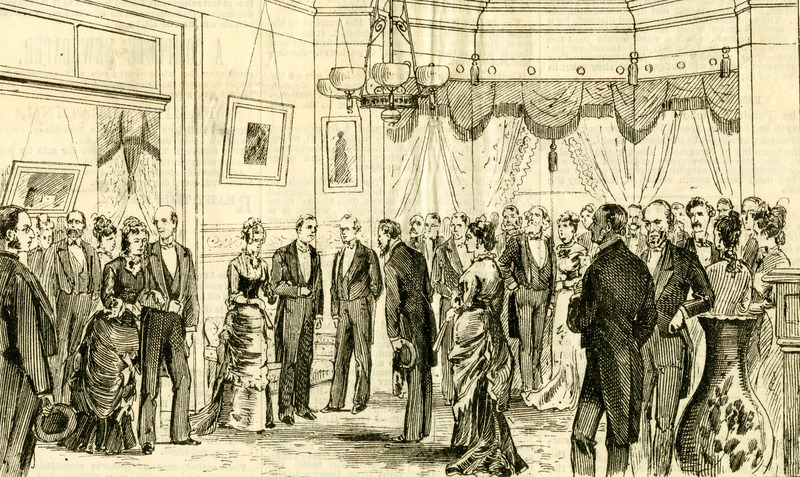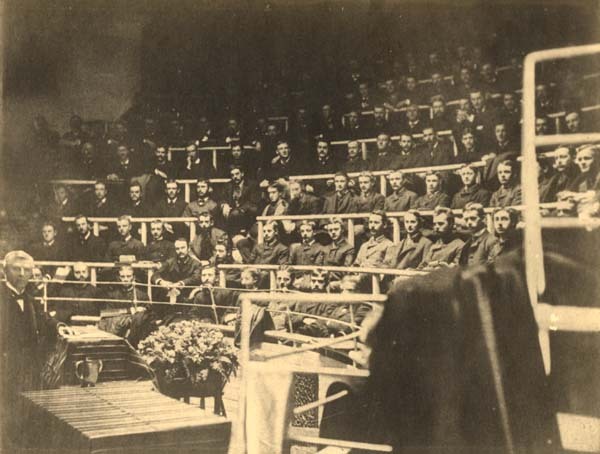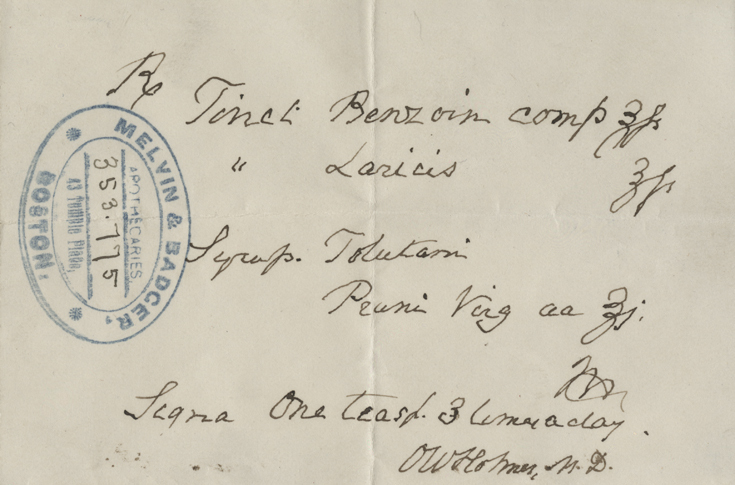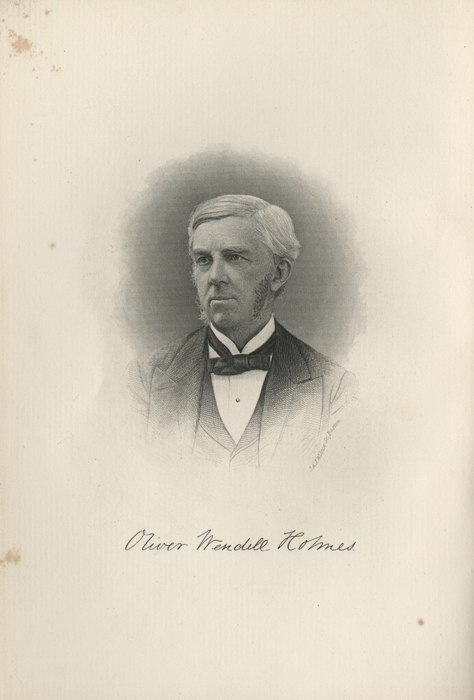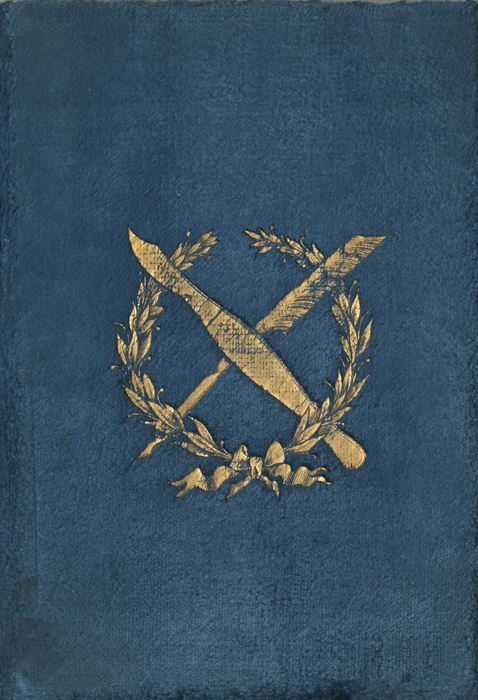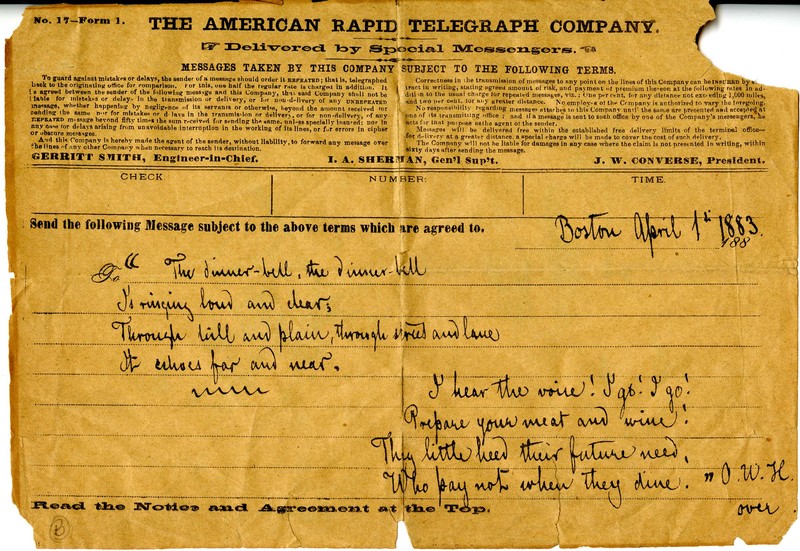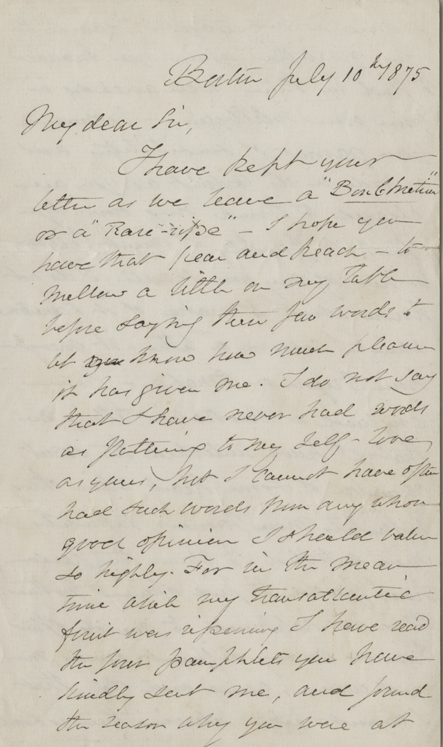Twilight Years
The famous "Atlantic Breakfast," given by the publishers of The Atlantic monthly on December 3, to honor Holmes at 70 and his contributions to the success of the magazine, was covered in local newspapers. Guests at the event included literary figures Henry Wadsworth Longfellow, William Dean Howells, Sarah Orne Jewett, and John Greenleaf Whittier, along with Harvard's president, Charles W. Eliot. Holmes later wrote to Howells, "You showed, I thought, great tact, and savoir dire and faire in your management of the south pole of the festival. Of course I was pleased—how could I help being pleased—with the penetrating and nicely accented praise you awarded me…. I hope you will live to see your septuagenarian breakfast and many a breakfast on the other side of it, not only famous, but happy in all that surrounds you.”
At Holmes’ retirement, the Overseers of Harvard University said, "Taking great interest in his classes, he has met them with conscientious punctuality and never-failing enthusiasm. By the ingenuity of his demonstrations, the vividness of his descriptions, the brilliancy of his imagination, and the ever ready resources of his varied erudition, he has given to the dry details of a difficult study a rare attraction."His final act for Harvard was to give the opening address at the Medical School’s centenary and dedication of its new building on Boylston Street on October 17, 1883, where Holmes reflected on the School in 1783, 1833, and the present day.
This photograph was taken on the occasion of Holmes’ retirement from teaching anatomy at Harvard and just after the opening of the school's new facility on Boylston Street. Some years later, Thomas Dwight recalled, “The scene was most impressive as the whole audience arose on his entrance. A member of the first class stepped forward, and in a few words, carefully prepared but rather tremulously delivered, presented a silver loving-cup as a gift of the class and expressed their regret at the separation. Dr. Holmes was so surprised and affected that for once his readiness failed him. He could but utter a few disconnected sentences of thanks, and say that lest his feelings should overcome him, it were better he should keep to the lecture he had written.”
This handwritten prescription for a friend, probably to treat bronchitis, was made by Holmes shortly before his death in 1894.
Following Holmes’ resignation of his professorship at Harvard, the physicians of New York hosted a public dinner in his honor. The dinner was held at Delmonico’s on April 12. Dr. Fordyce Barker, president of the New York Academy of Medicine, was the honorary chairman of the event, and notable figures among the two hundred guests included Drs. Alonzo Clark, S. Weir Mitchell, Austin Flint, John Shaw Billings, Henry Jacob Bigelow, Samuel D. Gross, and William Pepper. In response to the toasts and speeches, Holmes delivered a 2,000 word poem.
The symbol of the event, embossed on the cover of the menu and a souvenir booklet of the proceedings, was a crossed scalpel and pen, as Holmes was “skilled to dissect with both.”
Each guest was given a mock telegram from “The American Rabid Telegraph Company,” quoting lines from Holmes’ poem, “A noontide lyric,” and reproducing a cartoon by L. S. Ipsen, showing Holmes carrying bones and books, greeted at Delmonico’s by Fordyce Barker. In the background is a policeman, representing Governor Benjamin F. Butler, in front of the Boston State House where investigative hearings into the use of anatomical specimens from inmates at the State Almshouse at Tewksbury were underway.
In this letter to an unknown correspondent, Holmes reflects on his career and activities: “My mode of life is rather solitary than social, though I have contributed my share of hilarity to scores of festivals and am almost entitled to be called the laureate of our local receptions of great personages …. I have long ceased to practice, but keep my professorship in the Medical School of Harvard University which occupies and amuses me for seven months of the year. I go to a dinner party once in a while and once a month to the Saturday Club where I meet Emerson, Longfellow, Lowell, and in other years used to meet Agassiz, Sumner, Motley, Hawthorne, and many others of more or less name and note…. But I find my sympathies not less active because I live a good deal out of the world and because I find myself so much at home among what are called elderly people—not, of course, recognizing myself as one of them…. It is the best reward of authorship to be greeted in terms of friendship, nay, something like affection by those whom our words have cheered, comforted, consoled, strengthened, stimulated, if not instructed.”

